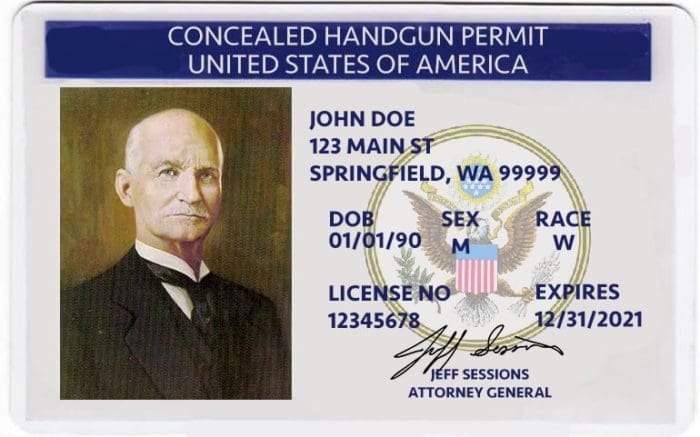By Jeff S.
As the word “compromise” should suggest, this is not intended to be an ideal proposal or one that comes anywhere close to what most gun rights enthusiasts would like. Instead, it’s intended as a proposal that addresses the major concerns of likely opponents of any national concealed carry reciprocity bill, while also addressing the concerns of gun rights supporters to provide a proposal with the greatest likelihood of actually being enacted without creating undue liabilities.
The major concern of gun control er, uh gun safety, no, wait, “gun violence prevention” supporters is the scary idea that virtually anyone could be licensed to carry a concealed gun in their precious community, rather than only in those backwards states that actually allow them now. This appears to be a fairly wide-spread concern, even though it ignores the fact that current CCW laws in their communities do little to deter criminals from carrying (especially if their community has a catch-and-release style of non-enforcement).
Their worry also ignores the very low crime rates in many states, such as Vermont, that don’t require any license or permit at all. Unfortunately, even irrational fears need to be addressed if they are sufficiently widespread as to cause significant political opposition.
The major concerns of gun rights supporters are the imposition of stricter requirements than under current laws, the potential for creating a backdoor government registry of gun owners, and the likely obstruction of any proposed permitting system by gun-hating state and local governments.
The basic proposal is to establish a federally authorized concealed carry permit which would have to be recognized in all states, territories, possessions, and districts of the United States.
To address the concerns of gun control supporters, the proposed federal CCW permit would require a minimum standard of firearms training, based on the stricter current requirements that states have (since the intention is to remove the concern of those in restrictive locations who fear less-vetted people carrying guns in their community). There would need to be some limitations to the requirements to assure that the standards are not unreasonably burdensome.
If a number of moderately restrictive states have similar requirements, a few outlying states that are much stricter should be ignored (and residents there can mull over why their state trusts them much less than other state governments trust their residents). A couple of base points might be that whatever required training, testing, etc, should not be greater than the firearm-specific training required of police officers, and should not be greater than whatever training (if any) is required for one to be licensed as an armed security guard, bodyguard, etc. (in those states that require it).
Of course, this would not placate the hard-core anti-gun zealots, but they will never be happy with any law that allows more people to be armed to defend themselves. What the minimum standards should do is satisfy the much greater number of people who are terrified of the idea of just anyone walking around with a concealed gun, but who are merely uncomfortable with the idea of trained citizens being armed.
With some basic training and testing standards established, there will be a need for training/permitting facilities, which presents the potential for gun-hating governments to try to sabotage the intent of the law. To reduce the ability of state and local government to obstruct implementation, the CCW should be a national document, which a citizen can obtain in any state.
So, if the government in Maryland or DC takes steps to block approval of facilities, citizens could travel to Virginia and go through the permitting process there. This would still impede those whose access to transportation is limited (at least while the state or local government is sued for non-compliance), but would at least help out a significant portion of the population who currently have no hope.
An obvious concern for a nationally based permit is that some would try to use it as a back door to creating a registry of gun owners. To prevent this, permitting facilities should be private operations (subject to certification by state or federal authorities), and the actual issuance of the permit should be done by the facility, with records kept there in a manner similar to a FFL maintaining records of firearm transfers.
Thus, once a facility is certified, neither the federal nor state government maintains a database of permits issued by the facility, but any law enforcement investigating a particular incident can check that the facility listed on the permit is certified (this certification would be on a central database) and contact the facility through the information available on the permit to check for validity or particular details relevant to the investigation. This decentralized scheme for issuing the permits should address the concern of creating a backdoor registry.
Another major concern of gun rights supporters is the threat of a new national scheme of interfering with existing CCW laws. The federal CCW permit system would simply be overlaid onto the existing laws, leaving current state laws and reciprocity agreements unchanged.
However, it should be noted that there is some risk that, with a national CCW scheme, gun control activists in less restrictive states will push for stricter state CCW requirements, using the national permit as a model to follow. Similarly, such a national permit would likely undermine the support for states loosening their concealed carry laws, as opponents will argue that the national scheme should be sufficient.
This downside (from the view of gun rights supporters) seems unavoidable, and the question is whether the effect of increased pressure against reduced CCW restrictions would be sufficient to offset the benefit of a system that would allow for broader legal concealed carry in locations that are currently excessively restrictive, and the eventual normalization of concealed carry as the predicted wild west shootouts and blood in the streets fail to materialize.
